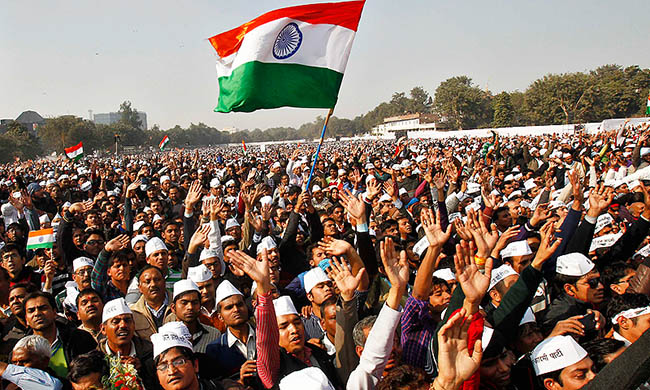To define democracy, It is believed that liberalism is the foundation stone of democracy and the view of John Locke, the 17-century philosopher who is credited with founding liberalism as a distinct philosophical tradition, is highly essential in this regard. According to Locke, man has a natural right to life, liberty and property while adding that governments will not have to violate these rights based on the social contract. He also defined the concept of the separation of church and state. Based on the social contract principle, he argued that there was a natural right to the liberty of conscience, which he believed must, therefore, remain protected from any government authority. Locke’s theory echoed in the US Declaration of Independence, written by Thomas Jefferson, as, “We hold these truths to be self-evident, that all men are created equal, and are endowed by their creator with certain unalienable rights, that among these are life, liberty, and the pursuit of happiness.” In India, you will think that the seeds of Locke’s theory are sowed there by Indian founding fathers in pursuit of a peaceful life. People’s natural rights are ensured under a true democratic state.
The prominent feature of social life in India is religious tolerance. People exercise their rights and freedom without a sense of fear or encountering barriers from the public. The ground is paved for both religious and secular practices and one acts upon his/her beliefs and creed freely. Neither ideological differences nor racial and sexual varieties pose threat to their life and liberty. The individuals do not deem themselves superior or inferior on the basis of their accidental backgrounds such as caste, creed or color.
The true spirit of democracy is exercised in India. The fact is that Indian nation reaps the fruit of non-violent revolution of their founding fathers, who laid the cornerstone of democracy and freedom, and the struggles made by their present leaders. Their democratization process has grown mature enough which let citizens live a peaceful life. Mosques, churches and temples stand proudly next to one another, which reflect the culture of acceptance and tolerance rather than being a bone of contention. Sikh’s turban, Muslim’s hijab and Hindu’s sari, which signal their religion, decorate the chains of people on the street, recreational areas, playgrounds, before Taj Mahal and in queues of polling stations to use their suffrage equally instead of being used as justification for spilling their blood, violating their rights and dignity or infringing on their liberty.
The voting suffrage and equal rights of the citizens are supported by law and state. Moreover, magnitude, diversity and complexity of demography, ethnicity and geography place no barriers before citizens while enjoying their rights. Presidential election, which is termed as “festival of democracy” in India, displays the citizens’ equal rights and held to the satisfaction of the public, which strengthen the trust between state and nation. Government facilitates the ground for public voting in the best possible way and a single vote matters for the state. To spread awareness in every part of the country, Indian government launches Systematic Voter Education and Electoral Participation (SVEEP) program, a number of voter-friendly services through telephone call centers and SMS-based helplines, ATM-type touch-screen information kiosks at conveniently located public places, internet-based search facilities, etc. in the election held in 2014, the Election Commission of India (ECI) optimized the use of Information and Digital Technology (IT) in the electoral process of India – which provides speed, quality and transparency to electoral processes and reduces the interface with human beings, who may sometimes be biased or causing unwarranted issues.
Similarly, the counting process is held under the watchful eyes of observers, political parties and media. As a result, for counting duty in 2014, deployment of security personnel was drawn up a day before the counting, staff from various departments of state governments across India was deployed, a central observer for each counting center an micro-observer were decided upon, centers were prepared with security and logistical arrangements, video cameras were installed and a 100 m radius around the counting centers was declared out of bounds for public.
Indian deputy election commissioner, Umesh Sinha, said that every polling station had booth awareness group besides sending voter slips, that contain the address of polling stations and election’s date, to residents before polling day and also remind the people of the election day through SMS. According to him, the Indian government addresses urban apathy and provides the fastest track for the disabled and facilitates the ground for Indians, living abroad, to vote and also accepts proxy voters.
V.N. Shukla, the director (IT) who was also present in the meeting, believed that electoral reform is a need for Afghanistan and said that issuing electronic Tazkira will support transparency, in elections, to a great extent. In terms of paving the way for a true democracy, it is believed that there is much for Afghanistan to do and electoral reform is one of the key issues. Since election is an essential element in constituting a democratic system, it should be held transparently.
Indian’s democratic system can be a role model for Afghanistan. To pave the way for a true democracy, Afghan government will have to strengthen transparency in electoral processes and enforce the law strictly and the nation should cherish tolerance and respect the human rights and dignity of one another irrespective of their racial, sexual or religious backgrounds.
Home » Opinion » Democracy in India
Democracy in India
| Hujjatullah Zia

